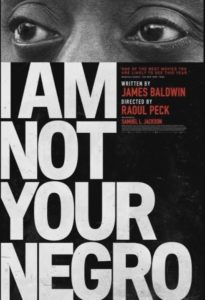Film Review: I Am Not Your Negro

James Baldwin was a national treasure. Through his masterful writing and oratorical deliberations on race and Black America’s constant struggle for justice and recognition of our humanity, Baldwin’s poetic potency proves timeless as it continues to enter our core, cozy up to our beliefs, confront harmful opinions we have of the world and others, and demand a more just reckoning.
And now an Oscar-nominated documentary has come along to reintroduce the world to his brilliant prose and social commentary.
I Am Not Your Negro is based on James Baldwin’s never-completed manuscript Remember This House, a book intended to examine the United States’ established tradition of white supremacy and anti-Black racism through memories of three assassinated civil rights leaders, his close friends Medgar Evers, Malcolm X, and Dr. Martin Luther King Jr.
Director Raoul Peck (Lumumba, Sometimes in April) amplifies Baldwin’s unfinished project through footage of the author’s various public appearances, excerpts from the FBI’s disgraceful file on the author, and visual material that intercuts past and recent events to expose parallels between yesterday’s injustices and today’s social ills.
Three directing choices help solidify this movie’s greatness. First, the entirety of the narration is told through Baldwin’s eyes, whether from his unfinished manuscript or through interview and lecture footage. While the general audience is likely well acquainted with the three figures Baldwin analyzes, his insight provides us with a more intimate account that separates the men from the mythic, one-dimensional narratives we’re accustomed to.
Second, Samuel L. Jackson’s narrating style. Many reported not recognizing Jackson’s voice, as it was uncharacteristically subdued and a considerable departure from the fiery inflection we associate with his cinematic presence. This actually compliments the gravity of the subject matter, while also lending its own, unique intensity through the content of the dialogue.
Third, Peck’s wielding of archival images incisively juxtaposes Baldwin’s words over a montage of cultural motifs, Black disenfranchisement, police brutality, and extrajudicial graphic violence (including images of lynching), along with his moral outrage at white apathy that coddles whiteness at the expense of all else. Imagery that captures the tangle of Black resistance and white backlash spanning the civil rights era to contemporary racial justice movements (think Ferguson) is interwoven in such a way that it situates Baldwin as an oracle, a chronicler of society who has transcended the grave to articulate the continued weariness and justifiable indignation of Black America.
Unfortunately, what I Am Not Your Negro has to say about prejudice, institutional power, controlling images, stereotypes, and the great moral compromise of this nation reveals that Baldwin’s vision of our society remains hauntingly relevant thirty years later. It’s also an analysis of how the past remains saddled to the present, making the point that to conceptualize history as some distant thing detached from life circumstances, social systems, cultural norms, and the status quo is a critical error.
Peck finds a way to capture the richness of Baldwin’s charisma and the complexity of his optimism, which was far too acquainted with the world’s evils to not include a healthy dose of practicality and vigilance. Perhaps more than anything else, I appreciate the way this film demolishes misleading, pervasive ideas that would have us believe racism is purely based on hate and bad intentions. I Am Not Your Negro strips the viewer of these illusions by providing numerous examples of how racism functions as an oppressive system based on power.
For sure this film will make some (mainly white folks) uncomfortable. For white and non-white people alike it will elicit complex emotional responses that range from rage to sorrow to joy, or some combination of those emotions. You will want to cheer, look away, cringe, laugh, and weep.
I Am Not Your Negro is a visceral, rousing, and evocative collision with reality that most want to deny. Baldwin’s impassioned critique of race and racism compels the viewer to hang a question mark on values long taken for granted. Further, it demands that white Americans reconsider their definitions of the world that contribute to the ongoing annihilation of all those such definitions exclude.
In the age of “alternative facts,” the verdict’s still out on whether the majority of white America, 400 years later, is ready to honestly answer this inquiry and call to action.
